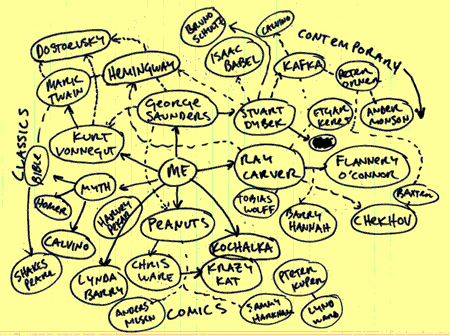
I was on the phone one day with my friend Brandon. Brandon’s a writer, been a serious one for a lot longer than I have, so whenever I get him in a conversation, I drop a little, “So what’re you working on?” question somewhere in the middle of things, a little bait, to see if maybe he’ll bite and spill the beans.
“Oh, I’m just reading, mostly.” The kind of answer that drives me nuts.
So I said, “Well, what are you reading?”
He told me he was picking out certain authors, and then reading everything that author had ever written. (I think at the time, he was tackling Flannery O’Connor, James Baldwin, and Ian McEwan.) I freaked out a little bit, and said, “Jesus, man, how disciplined of you! I can’t even finish a novel!”
So I hung up later, and got to thinking about his project. A few days earler, I’d read a line of advice from G.S.: “Find two or three writers that you’re really excited about. Follow their lineage back. Know everything about them. Immerse yourself in those writers.” This really clicked with me.
Since I started working in a library, I’ve been on book overload. I can get any book, anytime. No limits. Always a bad idea. So much to read. So little time. Really overwhelming. But this, this was a really great idea: Take it slow and steady. Saturate yourself with a writer’s work. Figure out who means the most to you right now, and then read who meant the most to them. No problem.
But how to begin? A list seemed too linear. What I needed was a map.
I’ve always been a nut about genealogy. When I was in undergrad, Brandon gave me a book of Carver stories. I fell in love with them. Then I found out our teacher had been taught by John Gardner, the same John Gardner who taught Ray Carver. I started building this goof-ball lineage in my mind…that I was somehow inheriting what had come before me.
A family tree!
So once in a while, when I’m feeling lost, feeling a little schizophrenic in my reading habits, I’ll draw a dorky map like the one above, who I’ve read, who I should read.
Where I am, where I should be going.
This is a great approach, Austin. Starting about 10 years ago I went on a huge jag of reading John McPhee. Now I’ve read everything he ever wrote, which is something upwards of 30 books. Part of that process is finding out what you like about the writer – and I wouldn’t have read so much of McPhee if I didn’t like him – but part of it is also figuring out where you part company, not because he’s doing it “wrong,” but simply because his path is different from yours.
The genealogy thing applies in academics as well, by the way: you want to know where scholars went to school and who their mentors were. When you read their books with that in mind, you see a lot more about about what those writers are trying to do, the tradition in which they’re operating, and what they’re reacting against.
I only wish I had more discipline to follow through on the approach!